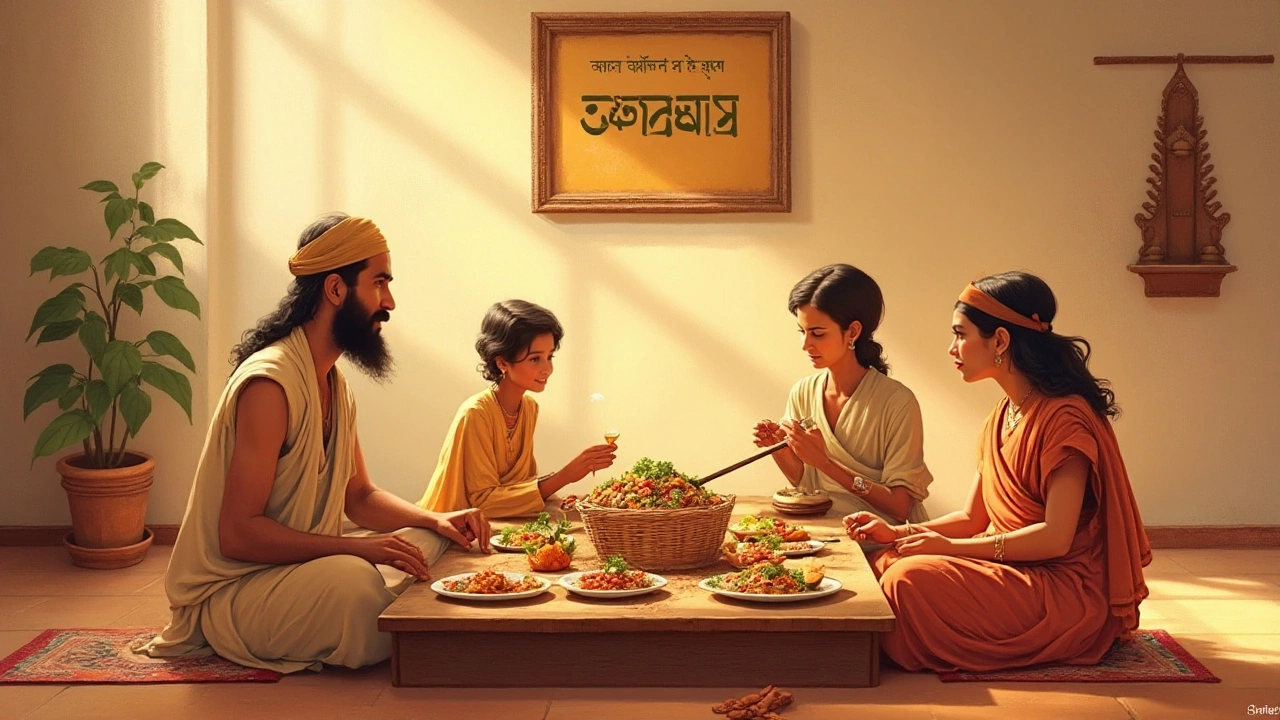Jainism is a religion with profound teachings that permeate every aspect of its followers' lives, including their dietary choices. Known for its strict adherence to non-violence (ahimsa), the Jain diet excludes several food items, including root vegetables. Carrots, among other tubers, are not consumed by Jains, a practice that often piques the curiosity of the unacquainted.
This exclusion is not merely a matter of tradition but a conscious choice aligned with a philosophy that values every form of life, no matter how small. As we delve into this article, you'll discover why the simple carrot does not make it to a Jain meal and how it ties into a larger worldview shaped by compassion and respect for all living beings.
- Jain Philosophy and Dietary Practices
- The Concept of Ahimsa
- Root Vegetables in Jainism
- Carrot: Why It's Excluded
- Alternative Ingredients in Jain Dishes
Jain Philosophy and Dietary Practices
Jainism, one of the world's most ancient religions, places a significant emphasis on living a life of non-violence and self-discipline. The principle of ahimsa, or non-violence, is at the core of Jain philosophy and dictates many aspects of daily life for adherents, including their dietary practices. Jain diet emerges from a profound respect for all living beings, fostering a lifestyle intended to minimize harm to other creatures. This means not only abstaining from animals and animal products but also considering the impact of uprooting certain plants. The Jain diet meticulously avoids harm to even the smallest living things, thus influencing what Jains eat and how they prepare their meals.
In Jainism, the intent behind actions matters as much as the actions themselves. This philosophical outlook shapes the unique dietary restrictions that find roots not just in avoiding harm but enhancing compassion and moderation in everyday choices. Root vegetables are often excluded from the Jain diet, as pulling these vegetables from the earth can destroy the entire plant and harm the soil's microscopic organisms. From an ethical perspective, this practice aligns with the commitment to minimizing violence, even towards invisible beings. Such dedication to a cause engrains the diet with spiritual significance, where your choice of food represents an offering of devotion.
"Non-violence is the highest religion" - Lord Mahavira, reflecting on the essence of Jain spiritual thought.
Moreover, Jains often engage in periods of fasts and dietary restraints to purify their mind and body, reflecting the spiritual over material, and the soul over the temporal world. These acts of self-discipline are not mere dietary choices but expressions of profound spiritual engagement with the divine truth. Adhering to these practices helps them achieve spiritual clarity and highlights the importance of every living entity within the grand tapestry of life.
In embracing such rigorous dietary restrictions, Jains often depend upon leguminous beans, grains, fruits, and other non-root vegetables. This practice inspires culinary creativity, as traditional Indian dishes are adapted to fit Jain principles without sacrificing flavor or nutrition. Foods such as simple lentil dals, vegetable curries sans ground vegetables, and a variety of bread, creatively seasoned, are staples in the Jain kitchen. Spices and herbs infuse these dishes with a taste that is flavorful yet adherent to ethical considerations, hence sustaining a lifestyle that is both spiritually uplifting and gastronomically enriching.
The Concept of Ahimsa
The principle of ahimsa, central to Jainism, represents non-violence in its most profound form. It is not merely the absence of physical harm but extends to thoughts and intentions, urging individuals to live in harmony with every life form. In Jain beliefs, every element of our surroundings, from air to water and beyond, is brimming with life, invisible yet profoundly influential. Embracing ahimsa means minimizing harm to every conceivable form of life, an endeavor that shapes their strict dietary practices. While modern vegetarianism focuses on abstaining from meat, the Jain approach takes a step further, with respect for all creatures influencing their every meal, every choice.
The application of ahimsa is truly exhaustive in a Jain's life, particularly in their interactions with plant life. Consuming root vegetables such as carrots involves uprooting the entire plant, leading to the destruction of multiple life forms hidden within the soil. Interestingly, this also means avoiding nightshades, bulbous plants and certain underground growths that might harbor insect life or require plant destruction for harvest. As per Jain philosophy, uprooting these plants violates the principle of ahimsa, as it interrupts the natural order and extinguishes untold microscopic organisms.
Understanding the radical compassion embedded in ahimsa gives clarity to their rejection of root vegetables. Carrots, specifically, are viewed as sustenance packed with potential life, and disturbing them constitutes a karmic action Jains strive to avoid. This belief reflects their respect for each life form, from the smallest to the most complex, encapsulating a vision of living that is both demanding and deeply inspirational. For Jains, these dietary sacrifices are not perceived as limitations but rather as deliberate choices that follow a creed of compassion and respect.
Ahimsa offers a unique framework guiding Jains towards a life devoid of harm and full of mindfulness. Historical texts explain that this is not only a dietary concern but extends to every aspect of existence, including occupation and daily interactions.
"Non-violence is the highest ethical code, benefiting all persons and leading one's soul towards liberation," once stated Mahavira, the 24th Tirthankara of Jainism, emphasizing the importance of this concept.The Jain perception of the universe as an ecosystem of interconnected life shines through their dedication to ahimsa, a practice more concerned with collective well-being rather than individual gratification.

Root Vegetables in Jainism
In Jainism, dietary practices go beyond mere preferences and dive deep into ethical decisions that resonate with their core belief in ahimsa, or non-violence. This principle is so expansive that it encompasses not only the avoidance of animal flesh but also specific plant types, notably root vegetables. From a Jain perspective, root vegetables like carrots, potatoes, and onions are seen as problematic for several significant reasons. Firstly, when harvesting these vegetables, one essentially uproots the entire plant, often terminating its life. Jains aim to avoid such direct harm to plants to maintain their commitment to non-violence not just toward animals, but to all living beings, including plants.
Moreover, the soil in which these root vegetables grow hosts various microorganisms. When these vegetables are harvested, countless tiny lives might be disrupted or destroyed, even if inadvertently. Such is the depth of the Jain commitment to ahimsa that even these microorganisms are considered deserving of protection. This attention to the finest details is a testament to how deeply-rooted their philosophy is, affecting seemingly mundane choices like what to serve on one's plate. This philosophical underpinning bestows a unique spiritual dimension to the Jain diet, going far beyond mere health and nutrition concerns.
Another fascinating facet of avoiding root vegetables is tied to how they can sprout anew. By leaving behind small sections of their roots or tubers in the ground, these plants can regrow or propagate. By uprooting them, the potential for future growth is halted. In Jain culture, this would mean suppressing life forms from naturally continuing their cycle of life, something they strive to avoid.
To get a better grasp of this worldview, consider this insightful quote from the respected Jain text Tattvartha Sutra:
"Non-violence is the highest religion. One should harm no living creature, as one should not want to be harmed by another."This embodies the sheer magnitude and holistic intent of Jain dietary customs. It beautifully captures the essence of how Jains align their actions with their spiritual doctrine of ahimsa.
For those trying to navigate the grocery aisles or plan a Jain-friendly menu, embracing alternative ingredients is crucial. Substituting root vegetables with grains, beans, lentils, or leafy greens is a common practice. Knowing how to adapt recipes without compromising on flavor or ethics is an art many Jain households have mastered over generations.
Delving into the choices surrounding food within Jainism opens a window into their broader spiritual outlook. In these choices, we can observe the quiet but profound devotion to the well-being of all of Earth's creatures. Root vegetables are just one piece of this vast moral puzzle, demonstrating how India's ancient traditions continue to inspire thoughtful and compassionate living today.
Carrot: Why It's Excluded
The exclusion of carrots from the Jain diet might seem puzzling to those unfamiliar with the religious and philosophical tenets that guide Jain dietary practices. To the Jain community, the act of consuming root vegetables such as carrots is in direct conflict with their commitment to ahimsa, which is the principle of non-violence. Carrots grow beneath the soil, entangled within an ecosystem that is rich with tiny microorganisms and a variety of insect life. When harvested, uprooting carrots inevitably leads to the destruction of these small life forms residing within the soil, as well as the plant itself.
Beyond the unseen life affected, the entire plant is sacrificed for its consumption, which Jains equate to a form of violence. This belief diverges from consuming crops that grow above the ground, where picking parts of the plant, such as fruits and leaves, doesn’t necessarily result in the plant's death. As a community firmly grounded in the belief of causing minimal harm, Jains choose not to partake in eating foods that compromise their commitment to protect all forms of life. This extends to other root vegetables as well, including potatoes, onions, and garlic.
"Jains abstain from eating roots like carrots to uphold the sanctity of all life," explains Anuradha Jain, a scholar in Jain philosophy. "By doing so, they live out their values in the most comprehensive way possible."
Another consideration in the exclusion of carrots is the potential for dirt and hidden pests to cling to their roots, making them difficult to clean thoroughly. Given the Jain dedication to purity and cleanliness in their food, this becomes a critical factor. An interesting aspect of the carrot is its vibrant color, attributed to beta-carotene, yet for Jains, even the color and nutrients offered do not outweigh the ethical implications of its harvest. It’s essential to understand that these practices aren’t just about visible harm. Jains believe in subtler energies and vibrational influences and how they affect the world around us.
Within the context of a rich vegetarian Indian dishes repertoire, the exclusion of carrots might seem limiting. However, it is precisely this love for and commitment to the sanctity of life that enriches Jain cuisine, encouraging creativity and innovation with alternative ingredients. By excluding carrots, Jains make a conscious choice that transcends dietary preferences, reflecting a profound awareness and intention to engage in a lifestyle that celebrates and protects life in the gentlest manner possible. This nuanced understanding of food ethics is central to Jain living, offering a model for compassion-driven dietary choices.

Alternative Ingredients in Jain Dishes
In the vibrant tapestry of Jain vegetarian cuisine, the exclusion of root vegetables like carrots necessitates a creative culinary approach. However, this limitation has given rise to a plethora of alternative ingredients that are not just substitutes, but enhance the dishes with unique flavors and textures. Jains often turn to a variety of gourds, beans, and other plants as the basis for their meals. For instance, bottle gourd, ridge gourd, and snake gourd are popularly used in Jain households for their nutritional value and adaptability in recipes. These vegetables can easily replace the bulk and texture that root vegetables provide in many dishes.
One notable ingredient that finds favor among Jains is the pumpkin. With its natural sweetness and pleasant texture, pumpkin can be used in myriad ways, from soups to curries, delivering the nourishment and satisfaction that a carrot might provide while adhering to Jain dietary restrictions. In addition, leafy greens such as spinach and fenugreek play a crucial role. They are abundant in nutrients and add a fresh, earthy flavor to the food, often replacing the need for vegetables harvested from beneath the ground.
Pulses and legumes are another cornerstone of the Jain diet, offering protein and substance in the absence of meat and certain vegetables. Lentils, chickpeas, and mung beans are commonly used, offering not only a hearty base for dishes but also incredible versatility in both traditional and modern recipes. These ingredients, when paired with aromatic spices, can form the heart of a delicious, filling meal.
Utilizing Spices and Flavors
Jain cooking is renowned for its rich use of spices, which transform simple ingredients into sumptuous, flavorful dishes. Cumin, coriander, turmeric, and asafoetida (hing) are frequently used, each contributing distinct notes that enhance the meal. Asafoetida, in particular, is valued for its ability to add depth and umami to dishes, which can often be missed in a strictly vegetarian diet.As renowned chef Sanjeev Kapoor once noted, "Jain cooking is a testament to the creativity and adaptability of the human spirit, turning simplicity into gourmet experience with nothing but simple herbs and spices."
Coconut and Nuts
In regions where coconuts are abundant, they are often used in Jain recipes as a primary ingredient. Both fresh and desiccated coconut can add a creamy consistency to curries and sweets. Similarly, nuts such as almonds, cashews, and peanuts provide a flavorful and nutritious punch, acting as thickeners in gravies or as delicious garnishes. Moreover, nuts are an excellent source of healthy fats, making them an indispensable component of Jain meals.Completing the Meal with Grains and Dairy
To complete the meal, grains such as rice, wheat, and millet are often preferred. These grains form the staple base, complementing the vegetables and lentils to provide a balanced diet. Dairy products, too, play an essential role. Paneer (Indian cottage cheese), yogurt, and ghee contribute to the richness and fulfillment of many Jain dishes without violating the principles of non-violence.Ultimately, the Jain diet, though restrictive, offers a wide array of alternative ingredients that not only support the philosophy of non-violence but also encourage culinary creativity and innovation within the boundaries of ethical eating practices.
